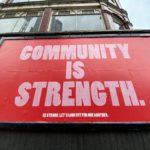 The United Kingdom has emerged as a global leader in fostering neighborhood trust and promoting inclusivity, according to research conducted by the Policy Institute at King’s College London.
The United Kingdom has emerged as a global leader in fostering neighborhood trust and promoting inclusivity, according to research conducted by the Policy Institute at King’s College London.
The study reveals a significant shift in social attitudes within Britain, as citizens have become increasingly comfortable with the idea of living alongside historically marginalized groups, including individuals belonging to the LGBTQ+ community, different racial backgrounds, immigrants, and those living with AIDS.
“The UK public are highly trusting of the people in their neighborhood and very comfortable being neighbors with a wide range of groups, compared with many other nations and our own past views,” the researchers explain.
Most accepting
Among the 20 countries examined in the study, the UK stands out as the most accepting nation, or at least one of the most tolerant, when it comes to residing next to diverse individuals, encompassing various religions and languages. This liberalization of attitudes reflects a progressive trend within British society.
However, it is important to note that not all segments of society have experienced this same level of acceptance. Surprisingly, while overall tolerance has increased, there has been a decline in openness towards individuals struggling with drug addiction, with a majority of the public expressing reservations about having them as neighbors. Similarly, a significant proportion of the population still expresses concerns about residing near heavy drinkers.
The analysis was conducted as part of the World Values Survey (WVS), one of the world’s most comprehensive and widely recognized academic social surveys. The survey has been in operation since 1981, providing valuable insights into long-term trends in public opinion. The data collected for the UK was obtained in 2022, while data for other countries was gathered between 2017 and 2022.
Trusting neighborhoods
Trust within neighborhoods in the UK ranks among the highest globally, with only three countries—Egypt, Sweden, and Norway—surpassing the UK’s 84% level of trust in local communities. This stands in stark contrast to the United States, where only 72% of respondents expressed trust in their neighbors.
“The UK public are highly trusting of the people in their neighborhood and very comfortable being neighbors with a wide range of groups, compared with many other nations and our own past views,” the researchers explain.
Furthermore, unlike the US, which has experienced a decline in trust over the past decade, the British public’s trust in their neighbors has actually increased from 78% in 2005 to 84% in 2022.
Geographically, trust levels vary within the UK. Northern Ireland emerges as the region with the highest level of trust (90%), followed by England (84%), Scotland (81%), and Wales (81%). Among the different regions in England, the South West boasts the highest level of trust in neighbors, with 93% expressing confidence in their local communities.
Social attitudes
The study reveals a remarkable transformation in British attitudes toward historically marginalized groups. In 1990, nearly a third of Britons expressed reluctance to have homosexual neighbors, a figure that has drastically dropped to 4% in 2022. Similarly, reservations about living near individuals with AIDS have declined from 23% in 1990 to 4% in 2022.
Over a longer time span, between 1981 and 2022, the proportion of the population citing concerns about immigrants and foreign workers decreased from 13% to 5%. The number of individuals expressing discomfort with having neighbors from different racial backgrounds has also significantly decreased, dropping from 10% to just 1%.
However, the study indicates that there are two groups for which attitudes have either hardened or remained persistently negative. In 2022, a vast majority (83%) of Britons expressed unwillingness to have drug addicts as neighbors, a substantially higher percentage compared to 1990. Additionally, there has been a notable increase in reservations about residing near heavy drinkers since 2018, with 57% of the public expressing such concerns in 2022.
When compared internationally, the UK ranks as the most accepting nation, or among the most accepting, of various marginalized groups as neighbors. Only 4% of the British public expresses reservations about living near individuals with AIDS, with Germany and Brazil coming closest with 6% each.
“It seems absurd that as recently as 1990 nearly a third of people in the UK said they’d be uncomfortable with gay neighbors, but this is now down to just 4%, and reflects a wider rapid change of attitudes, shown in increased acceptance of people from different races and immigrants,” the authors explain. “These shifts have been seen in other countries too, but the UK has often shifted more than many others, putting us now among the most open countries in the study.”